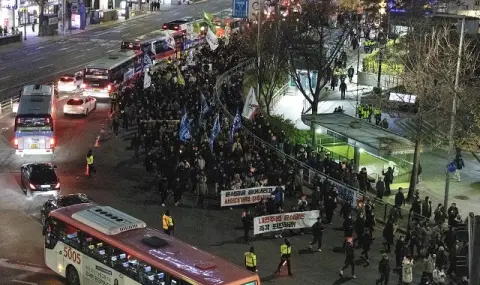The disputed South Korean President Yoon may have had legitimate objections to the opposition, but his declaration of martial law backfired and revived memories of past military dictatorships.
Conflicts in South Korean politics continue today. President Yoon Suk-yeol declared martial law on Tuesday evening, but lifted it six hours later after parliament did not accept his decision. The scenes of armed soldiers on the steps of Parliament and surrounding the building shocked the nation and revived memories of the military dictatorships that ruled from the mid-1960s to the late 1980s - often with an iron fist used against dissenters.
On Wednesday morning, the largest opposition party tabled a motion to impeach the president. Yun was already in the Democratic Party's crosshairs after a politically trying year that saw his approval rating drop to just 19 percent in recent days. The opposition, which holds a majority in parliament, is seeking to make political capital out of the sudden declaration of martial law, which Yun announced in a televised address to the nation on Tuesday.
Clash with the opposition
While the conservative Yoon may have had legitimate grievances with the Democratic Party for using its parliamentary majority to push through legislation, analysts say the president erred by declaring martial law, leaving him more vulnerable than ever.
"The media and the public have been very critical of the Democratic Party's actions, and it seems that Yoon has misinterpreted this as a sign of great support, which he did not really have,'' said Kim Sang-woo, a former politician with the left-wing South Korean New Policy Congress. , and now a board member of the Kim Dae Chun Peace Foundation. "The opposition is abusing its positions to push bills that Yun says are against the national interest. They demand legal investigations against his wife and a series of proposals for the resignation of high-ranking members of the government," he told DV.
The opposition is able to make these moves because it has a majority in parliament after triumphing in by-elections earlier this year, putting Yun in a difficult position midway through his term. The opposition is accused of "using impeachment motions against key officials and manipulating the budget debate to undermine the positions of cabinet ministers, heads of government agencies and other key figures believed to have conflicts with the party" ;.
Yoon's misjudgment
The party "People's Power" Yun was also angered when the Democratic Party used its majority to push through $67.8 billion in defense budget cuts. won (45.7 million euros). In declaring martial law, Yun said it was "aimed at rooting out pro-North Korean forces" in opposition without providing evidence or details. The move is reminiscent of the country's leaders in the late 1980s, who used the issue of the North Korean threat when trying to control dissidents and political opponents.
"Yun's declaration of martial law was both a legal overreach and a political error that unnecessarily put South Korea's economy and security at risk,'' said Leif-Erik Easley, a professor of international studies at the university. ;Ewha” in Seoul. "With extremely low public support and without strong support in his own party and administration, the president should know how difficult it will be to push through this decree," he told DV. "He sounded like a politician under siege, making a desperate move against mounting scandals, institutional obstruction and calls for impeachment that are now likely to intensify. "Yun did the right thing by lifting martial law because it reduced the likelihood of violence or a constitutional crisis," Easley added.
South Korea is facing political instability
However, South Korea faces instability as the standoff between the executive and legislature continues. "When he was elected, Yoon had 26 years of experience as a prosecutor, but absolutely no political training and no idea how to run a country," says Kim Sang-woo.
The opposition has called on Yoon to resign immediately as the capital Seoul prepares for new demonstrations. "People voted for him because he is not an established politician and said that he is not loyal to his political predecessors and that he is independent," the expert explains. The situation, according to him, is dangerous: “People heard "martial law" and immediately the traumatic images from the years of the military dictatorships returned to their minds.
